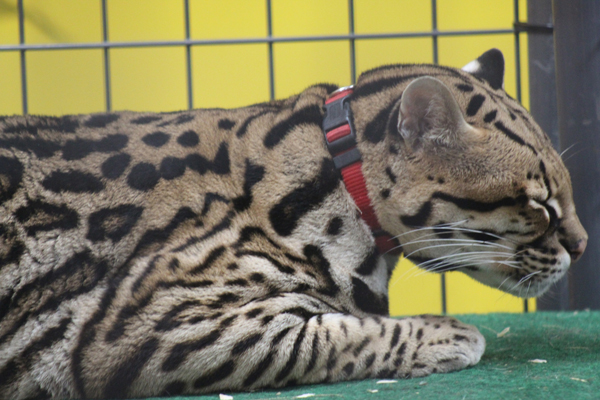- La Feria Community Holds Succesful Business Mixer Event
- Little Nashville to Take Place in Downtown Mercedes
- Lions Basketball Captures District Gold
- La Feria ISD Students Compete in Regional Chess Tournament
- Lions End First Half of 32-4A on a High Note
- La Feria ISD Held Another Successful Parent Conference
- Strong Appearance for Lions at Hidalgo Power Meet
- LFECHS Students Get to Meet Local Actress
- Students Participate in Marine Biology Camp
- Two LFECHS Students Qualify for All-State Band
Ocelot Conservation Day Held at Brownsville Zoo
- Updated: March 15, 2019

Clyde, one of two ocelots from the Texas Zoo in Victoria, was shown at Gladys Porter Zoo during Ocelot Conservation Day. Photo: Tony Vindell/LFN
by Tony Vindell/LFN
Two critically endangered ocelots laid quietly in their cages in the Educational Room at Gladys Porter Zoo in Brownsville, but the endangered cats are not part of the zoo’s collection of animals and birds.
They were there on display during Ocelot Conservation Day, which is an annual event to inform the public about the precarious condition these felines face today and what can be done to ensure they live for generations to enjoy.
The two spotted cats with long tails came from the Texas Zoo in Victoria and were the highlights of a presentation concerning their loss of habitat and how many are estimated to be living in Willacy and Cameron counties and in the Mexican state of Tamaulipas.
Some 50 ocelots live in the two South Texas counties.
Unfortunately, a few have been killed by vehicles either along Texas Highways 100 and 186 and Expressway 77, presumably because their habitats keep shrinking or during the breeding season.
Despite such factors, people can help the ocelot population to thrive by getting involved.
Among the things people can do is to participate in reforestation projects, by becoming a volunteer and by reporting any sightings of these highly nocturnal cats.
Chris Quezada, a ranger at the Laguna Atascosa National Wildlife Refuge, said an ocelot weighs from 15 to 30 pounds on the average and eats anything it catches like lizards, birds and mice that live in the dense thick brush called thornscrub.
Some of the reasons for their decline are the loss of habitat and fragmentation.
Kimberly Wahl, a plant biologist at the refuge, said reforestation can play a big role in conservation.
Anyone interested in learning about conservation can stop by the refuge or by joining Friends of the Laguna Atascosa NWR at 22817 Ocelot Road or by calling 956-748-3607 or 3608 Ext. 112.


